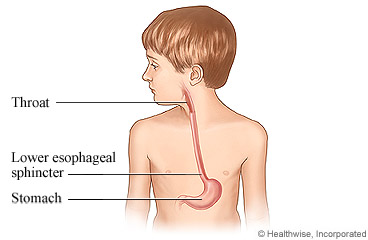Gastritis in Children: Care Instructions
Overview

Gastritis is an upset stomach. It happens when something irritates the stomach lining. Many things can cause
gastritis, such as an infection or illness, food or drink, or medicines. Your child's belly may bloat and
ache. Your child may belch, vomit, and feel sick to their stomach.
Minor stomach upset can be treated at home. Medicines that reduce or block stomach acid may help. If
gastritis lasts, your doctor may prescribe medicine.
Follow-up care is a key part of your child's treatment and safety. Be sure to make and go to all
appointments, and call your doctor if your child is having problems. It's also a good idea to know your
child's test results and keep a list of the medicines your child takes.
How can you care for your child at home?
-
Have your child take medicines exactly as prescribed. Call your doctor if you think your child is having a
problem with a medicine.
-
Note when your child gets an upset stomach. Write down any foods, medicines, or events that seem to cause
stomach upset. Avoid these in the future.
-
Do not give your child over-the-counter medicines without talking to your doctor first. Do not give
Pepto-Bismol or other medicines that contain salicylates, a form of aspirin.
-
Watch for and treat signs of dehydration, which means that the body has lost too much water. Your child's
mouth may feel very dry. Your child may have sunken eyes with few tears when crying. Your child may lack
energy and want to be held a lot. And your child may not urinate as often as usual.
-
Give your child lots of fluids a little at a time. This is very important if your child is vomiting or has
diarrhea. Give your child sips of water or drinks such as Pedialyte or Infalyte. These drinks contain a mix
of salt, sugar, and minerals. You can buy them at drugstores or grocery stores. Give these drinks as long as
your child is throwing up or has diarrhea. Do not use them as the only source of liquids or food for more
than 12 to 24 hours.
-
Avoid foods that make your child's symptoms worse. These may include chocolate, mint, alcohol, pepper,
spicy foods, high-fat foods, or drinks with caffeine in them, such as tea, coffee, colas, or energy drinks.
-
Start to offer small amounts of food when your child feels like eating.
When should you call for help?
 Call 911
anytime you think your child may need emergency care. For example, call if:
Call 911
anytime you think your child may need emergency care. For example, call if:
Call your doctor now or seek immediate medical care if:
Watch closely for changes in your child's health, and be sure to contact your doctor if:
Current as of: October 19, 2023
Content Version: 14.0
Care instructions adapted under license by your
healthcare professional. If you have questions about a medical condition or this instruction, always ask
your healthcare professional. Healthwise, Incorporated disclaims any warranty or liability for your use of
this information.